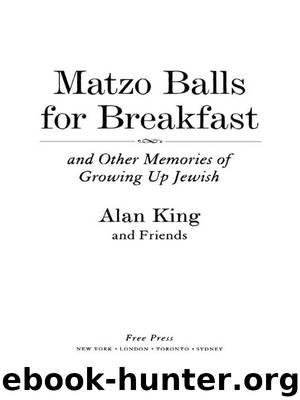Matzo Balls for Breakfast by Alan King

Author:Alan King
Language: eng
Format: epub
Publisher: Simon and Schuster
Published: 2005-07-15T00:00:00+00:00
#xa0;
Growing Up with the Holocaust
Joel Siegel
Joel Siegel is film critic and entertainment editor for ABC-TV’s Good Morning America. In his youth, he also served as a joke writer for Robert F. Kennedy and collaborated with Terry Gilliam of Monty Python fame.
IGREW UP WITH THE HOLOCAUST. I was born in 1943. My parents didn’t try to hide the Holocaust from their little boy. They were young, in their early twenties, with family in Poland and Romania. No one then could have imagined what had happened to their families.
I grew up in East Los Angeles, Boyle Heights—think of the Lower East Side with stucco—where people came from everywhere and where I knew when I got old I’d speak with an accent; every old person did. I just didn’t know what kind of accent: Jewish, Southern, Mexican, Irish, Italian, Chinese, Japanese. One day, it must have been 1948, I was in the first grade, and my reading group was talking about where we were born. I was born in Los Angeles; someone was born in Chicago; Lucille, on whom I had a crush, was born in New York. A Japanese girl, I think her name was Jeannie, said she was born in a concentration camp. I cried all the way home. I knew about concentration camps in 1948; I had family who died in them.
Fifty years later, I was watching The Joy Luck Club, a very good movie, and, during one scene, I started to sob so hard I almost doubled over. They were Chinese immigrants, living in San Francisco. A letter had come from their old country with news of the death of one of the girl’s family. Raised American, she didn’t speak Chinese, and the aunt who read the letter lied to her, told her everyone was fine.
I remembered almost the same scene taking place in my parents’ bedroom just after the war. I guess I was three or four. All the women in the family were there, even Mrs. Fink, a very old, fragile woman, my mother’s great-aunt; her high-pitched voice and soft Yiddish accent made her one of my favorites. They were reading a letter in Yiddish and crying.
“What’s wrong, Mommy?” I asked.
“Nothing,” she told me. “This is a letter from Poland that tells us everybody is okay.”
The film brought it all back. My mother was lying. This was the letter that told her that everyone had died: her grand-parents, aunts, uncles, cousins. But, we’d learn a few months later, some survived. She got a letter from an American soldier stationed in Germany who had found one of her aunts, Dvaireh, and her two children, Sara and Itzhak, in a displaced-persons camp in the American Zone.
When Hitler and Stalin divided Poland in 1939, Pinsk, where my mother was born, ended up as part of Russia. Stalin arrested and sent to Siberia everyone in the Russian half of Poland who had any organizational skills: labor leaders, schoolteachers, priests, and my great-uncle Zyskind, Dvaireh’s husband, who had been the secretary-general of the Zionist Party in Pinsk, a hotbed of Zionism where Golda Meir and Chaim Weizmann were born.
Download
This site does not store any files on its server. We only index and link to content provided by other sites. Please contact the content providers to delete copyright contents if any and email us, we'll remove relevant links or contents immediately.
| African-American Studies | Asian American Studies |
| Disabled | Ethnic Studies |
| Hispanic American Studies | LGBT |
| Minority Studies | Native American Studies |
Cecilia; Or, Memoirs of an Heiress — Volume 1 by Fanny Burney(31360)
Cecilia; Or, Memoirs of an Heiress — Volume 3 by Fanny Burney(30957)
Cecilia; Or, Memoirs of an Heiress — Volume 2 by Fanny Burney(30913)
The Great Music City by Andrea Baker(21914)
We're Going to Need More Wine by Gabrielle Union(18094)
Bombshells: Glamour Girls of a Lifetime by Sullivan Steve(13126)
Pimp by Iceberg Slim(12957)
All the Missing Girls by Megan Miranda(12791)
Fifty Shades Freed by E L James(12470)
Talking to Strangers by Malcolm Gladwell(11925)
Norse Mythology by Gaiman Neil(11920)
Crazy Rich Asians by Kevin Kwan(8381)
Mindhunter: Inside the FBI's Elite Serial Crime Unit by John E. Douglas & Mark Olshaker(7860)
The Lost Art of Listening by Michael P. Nichols(6495)
Enlightenment Now: The Case for Reason, Science, Humanism, and Progress by Steven Pinker(6422)
Bad Blood by John Carreyrou(5793)
The Four Agreements by Don Miguel Ruiz(5540)
Weapons of Math Destruction by Cathy O'Neil(5062)
We Need to Talk by Celeste Headlee(4891)
